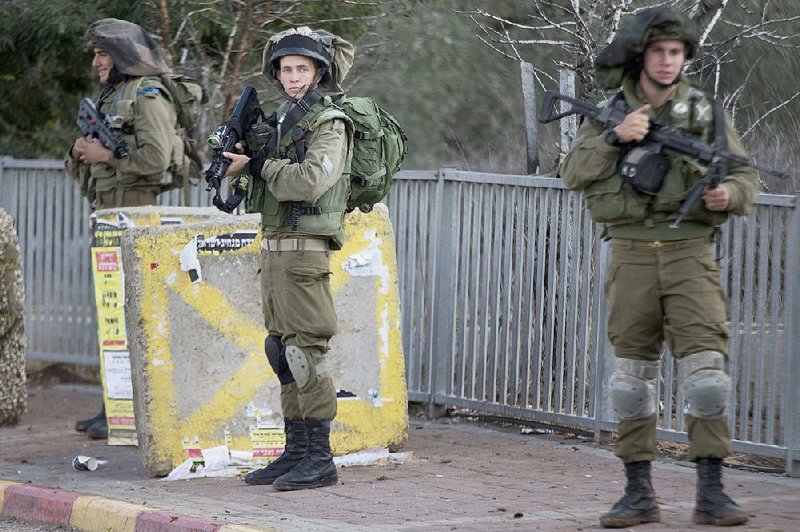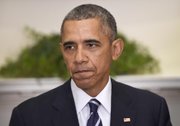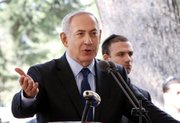WASHINGTON -- President Barack Obama and Israeli Prime Minister Benjamin Netanyahu will meet in Washington today, both seeking to move beyond their disagreement over the Iran nuclear deal.
The leaders plan to discuss how to counter Iranian aid to the Hezbollah and Hamas groups, the Russian and Iranian efforts to prop up Syrian President Bashar Assad, and steps that might demonstrate Netanyahu's commitment to a two-state solution even in the absence of negotiations with the Palestinian Authority.
The most tangible piece of the agenda, however, is a 10-year memorandum of understanding on military cooperation between the two countries that would budget aid and lock in a plan for new weaponry to deal with what Obama's administration said is a "dangerous neighborhood."
The two leaders are being propelled by different forces. By reaffirming support for Israel's security, Obama is seeking to reassure Democrats who backed the Iran deal despite their strong support for Israel and misgivings about the the Iranian regime.
By appealing to American Jews for unity, by delivering speeches at a conservative and a liberal think tank, and by drawing closer to Obama, Netanyahu will seek to repair relations with American Jews and solidify his political standing at home as a wave of stabbings of Israelis by Palestinians has put Israel on edge.
"There's a kind of capstone quality to this for both of them," said Dennis Ross, a Mideast peace negotiator for three presidents and author of the newly released Doomed to Succeed: The U.S.-Israel Relationship from Truman to Obama. "Both the president and the prime minister have an interest in this meeting, at a minimum, to appear to go well."
On the American side, there is a sense of limited ambition that contrasts sharply with the hopes Obama outlined six years ago in a speech in Cairo, where he spelled out ways in which Israelis and Palestinians could move beyond mutual blame and take steps toward peace.
Israel, he said then, should "live up to its obligation to ensure that Palestinians can live and work and develop their society." He added: "Just as it devastates Palestinian families, the continuing humanitarian crisis in Gaza does not serve Israel's security. ... Progress in the daily lives of the Palestinian people must be a critical part of a road to peace, and Israel must take concrete steps to enable such progress."
Many Mideast experts say Obama was naive about both Israeli and Palestinian willingness to take steps toward peace and about his own ability to bridge long-standing and deeply felt animosities.
But Obama no longer harbors hope for a peace agreement or even renewed talks during his presidency, the result of a "major reassessment," administration officials said in a conference call with journalists Thursday. Instead, he is searching for ways to keep alive the idea of a two-state solution when much of Netanyahu's Cabinet opposes it and when continued settlement expansion threatens to make it unworkable.
"Clearly, part of our assessment has been that we don't see a clear pathway right now to the type of negotiations that could produce a two-state solution, as much as we would like that to be the case," said Ben Rhodes, deputy national security adviser.
Obama plans to ask Netanyahu to lay out steps to show his commitment, even though Palestinian Authority leader Mahmoud Abbas in his speech to the U.N. General Assembly declared that his people would no longer be bound by the Oslo Accords, which set into motion a partition plan that gave the Palestinians limited self-rule. Netanyahu has accused Abbas of inciting recent unrest.
"There will not be a comprehensive final status agreement in the remainder of his term, and there likely may not even be meaningful negotiations between the two sides," said Robert Malley, Mideast coordinator at the National Security Council. "Given that reality, which is a new one, how does the prime minister himself see Israel going forward, given its own interests in stabilizing the situation in preventing the emergence of a one-state solution?"
Palestinian officials must also take action so each party can "convince the other side that they're committed to a two-state solution," Malley said.
Rhodes said: "There are practical things that can be done on the ground to build back some degree of trust and cooperation between the two sides. Clearly, part of that also involves rejecting violence and rejecting incitement. And we've called upon the Palestinian leadership to do so."
Strengthening ties
Netanyahu arrives in Washington seeking to build on an already deep security relationship, hopeful that Obama will want to demonstrate his commitment to Israel after the Iran deal. Recently, Gen. Joseph Dunford, chairman of the Joint Chiefs of Staff, visited Israel and met with Netanyahu, and Israeli Defense Minister Moshe Ya'alon visited Washington.
The current memorandum of understanding on military aid doesn't run out until fiscal year 2018, but Netanyahu wants to lock in some key elements for the next decade. Those include improved missile defense, smaller-diameter bombs that could be dropped on targets while minimizing civilian casualties, and F-35 fighter planes, which are stealthier than those Israel has, said Loren Thompson, chief operating officer of the Lexington Institute and former professor of strategic studies at Georgetown University.
"The United States will not sell Israel anything it wants," Thompson said. "The United States is always trying to balance Israel's security with the security of its neighbors, so there is some constraint in what gets sold."
The talks on security will take place in the shadow of anxiety in Congress over the Iran deal and whether to impose new sanctions for its conduct outside the nuclear accord. The administration realizes new sanctions could undercut the nuclear accord if Iran thinks it will gain nothing from the deal.
Netanyahu and Obama will probably talk about sanctions as well as other ways -- including interdiction -- to respond to Iranian aid to groups such as Hezbollah and Hamas. On Friday, the Treasury Department announced sanctions on two individuals and four companies it said were buying military technology, including electronics, engines, communications and unmanned aerial vehicles, for Hezbollah.
Netanyahu also will be seeking to patch up relations with Democrats and American Jews who might have been put off by his trip to the U.S. earlier this year, before the Iran deal was reached. He and Republican lawmakers arranged for him to address Congress on that trip to denounce the negotiating efforts.
"He understands that the relationship needs to be repaired," said Rabbi Marvin Hier, dean and founder of the Simon Wiesenthal Center and a critic of the Iran deal who was among Jewish leaders who met with Obama this year.
But in patching things up, the sides could run into obstacles.
Last week, Netanyahu's newly appointed diplomatic spokesman Ran Baratz, a conservative commentator, suggested in Facebook posts that Obama is anti-Semitic and that Secretary of State John Kerry cannot be taken seriously.
White House officials, including Vice President Joe Biden, have expressed displeasure over the appointment of Baratz. Baratz is not on the trip, and Netanyahu has said he will decide how to address the comments after returning to Israel.
Addressing his Cabinet Sunday, Netanyahu made no mention of Baratz, saying the visit would center on "recent events in the Middle East."
West Bank attacks
Meanwhile, the unrest continued in Israel and the West Bank. A Palestinian attacker rammed his vehicle into a group of Israelis standing at a hitchhiking station in the West Bank on Sunday, wounding four of them before he was shot dead by paramilitary officers, Israeli police said.
Police spokesman Luba Samri said two of the Israelis were wounded in the attack, the latest in nearly two months of violence across the region.
Later, the Israeli military said a Palestinian woman stabbed a security guard at the entrance to a West Bank settlement. The guard was wounded and shot the woman, wounding her.
Security camera footage showed the woman wearing a black, full-length robe and a veil over her hair chatting with the guard and handing over documentation. As he looks down to inspect her papers, she reaches into her purse to pull out a long-bladed knife and swings it in his direction as they both fall out of the frame.
Elsewhere, the military said an Israeli man showed up at a West Bank checkpoint with a wound to his stomach. He said he was stabbed while shopping in a Palestinian village.
Since mid-September, 12 Israelis have been killed in Palestinian attacks, most of them stabbings, while 74 Palestinians have been killed by Israeli gunfire, including 47 who Israel said were involved in attacks or attempted attacks. The other 27 Palestinians were killed in clashes between stone-throwers and security forces.
Also Sunday, Israeli police said officers arrested an Israeli youth who attacked a human-rights activist last month. Footage of the attack showed a masked youth attack Rabbi Arik Ascherman and threaten him with a knife as he and other Israeli peace activists helped Palestinians harvest their olive trees.
Police also said that an officer wounded in a Palestinian attack earlier this month had died of his wounds.
Later, militants in the Gaza Strip fired a rocket at Israel that exploded in the south of the country, causing no injuries or damage, the military said. Gaza militants inspired by the Islamic State group have taken responsibility for recent rocket attacks. Israel holds accountable the Islamic militant group Hamas, which rules Gaza, in all attacks emanating from the territory.
Information for this article was contributed by Steven Mufson of The Washington Post and Josef Federman of The Associated Press.
A Section on 11/09/2015


